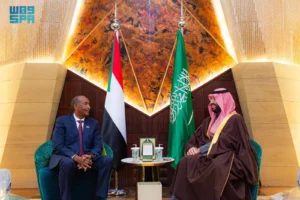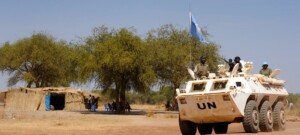Sudan govt lauds arrest of Kushayb, will discuss extradition of other suspects
The Sudanese government has welcomed the transfer of former Darfur janjaweed leader Ali Kushayb to the International Criminal Court in The Hague. It is willing to discuss the extradition of the remaining suspects. Displaced in Darfur, the armed movements, and human rights organisations call for the handover of the other indicted persons.
 New displaced seek refuge in Kalma camp in North Darfur, March 9, 2014 (Albert González Farran / Unamid)
New displaced seek refuge in Kalma camp in North Darfur, March 9, 2014 (Albert González Farran / Unamid)
The Sudanese government has welcomed the arrest of former Darfur janjaweed leader Ali Kushayb in the Central African Republic and his transfer to the International Criminal Court (ICC) in The Hague. It is willing to discuss the extradition of the remaining suspects. Displaced in Darfur, the armed movements, and Sudanese and international human rights organisations call for the handover of the other indicted persons.
As part of the Sudanese authorities' pursuit of justice for victims of the war in Darfur, Information minister Feisal Mohamed Saleh expressed in a statement the willingness of the Sudan government to discuss the extradition of the remaining suspects wanted by the ICC, namely former President Omar Al Bashir, his aide Abdelrahim Hussein, former Minister of State for Humanitarian Affairs Ahmed Haroun, and former rebel leader Abdallah Banda.
Saleh further stated that Kushayb has been charged with a number of crimes by the Sudanese authorities as well.
In April 2007, the ICC prosecutor issued arrest warrants for war crimes and crimes against humanity allegedly committed in Darfur against the former janjaweed leader. Kushayb was arrested in the Central African Republic on Monday after he surrendered himself voluntarily. He was immediately put on board an aircraft bound for The Hague in the Netherlands.
In presenting her 31st report on the Darfur situation to the UN Security Council yesterday afternoon, ICC Prosecutor Fatou Bensouda was permitted a note of triumph following the arrival of the first of the Sudanese indictees to be delivered to the court.
Al Bashir, Hussein, and Haroun were arrested in Khartoum after the ousting of their regime in April last year, and have been charged with several crimes. Al Bashir has already been convicted for money laundering and corruption. Banda has absconded.
On February 10, Khartoum and the Darfur rebel movements agreed during the ongoing peace negotiations in Juba, capital of South Sudan, to extradite Al Bashir and his aides to the ICC. Lt Gen Abdelfattah El Burhan, Chairman of Sudan’s Sovereign Council, commented some days later that this does not necessary mean they will physically stand trial at the court in The Hague. The ICC, however, does not try individuals unless they are present in the courtroom.
‘Historical event’
The Darfur Displaced and Refugees General Coordination as well welcomed Kushayb’s transfer to the ICC.
In a statement on Wednesday, General Coordinator Yagoub Abdallah described the militiaman's surrender to the court as “a historical event that has been awaited by the victims of the genocide and their families for more than 13 years”. He called on the Sudanese government “to fulfil its international obligations” and hand over Omar Al Bashir, Abdelrahim Hussein, and Ahmed Haroun to the ICC.
Abdallah further demanded the former governor of Central Darfur, Jaafar Abdelhakam, “one of the most senior aides of Ali Kushayb”, to be put to trial as well. He said that Abdelhakam is still training militiamen in Central Darfur. “They are to be held accountable for numerous human rights violations, also committed after Al Bashir was removed from power” in April last year.
The armed movements also lauded the arrest of Ali Kushayb. In separate statements, they called his transfer to the Hague “an important step that has long been awaited by thousands of relatives of genocide victims in Darfur”, and urged the Sudanese government “to take the courageous decision to hand Al Bashir and his partners in war crimes and genocide to the ICC immediately without restriction or condition”.
‘Much work remains to be done’
The International Federation for Human Rights (FIDH), the African Centre for Justice and Peace Studies (ACJPS), and the Sudan Human Rights Monitor (SHRM) as well welcomed the transfer of Kushayb to the ICC.
“This transfer renews hope that justice for Darfur crimes is possible, even in the face of relentless non-cooperation by Sudan and other States Parties,” the organisations said in a joint statement on Wednesday. “He will face fifty counts of crimes against humanity and war crimes allegedly committed in the Darfur region between 2003 and 2004.”
“We have long awaited the day when the militia leaders and political apparatus behind the Darfur genocidal campaign would be held to account,” said Mossaad Mohamed Ali, ACJPS Executive Director. “The transfer of Ali Kushayb is a powerful reminder that even if you run away from justice for years, the tables can turn at any time and justice will then catch up with you”.
“Beyond Ali Kushayb’s case, much work remains to be done to achieve accountability for the crimes committed in Darfur,” said Magdi El Na’im, SHRM Secretary General. “Whether domestically or at the ICC, the Sudanese transitional government must commit to prosecuting the remaining suspects for their alleged responsibility for war crimes, crimes against humanity and genocide committed in Darfur—not merely for corruption charges”.
ICC judges will set a date for a hearing where the prosecutor will present the charges against Ali Kushayb, with the latter fully entitled to defence rights. The judges will then decide whether to submit these charges, in whole or in part, to trial.
Victims of the crimes can also participate in these proceedings and present their view and concerns where their interests are affected. So far, only six victims are registered as participants in the case against the former janjaweed leader.
Radio Dabanga’s editorial independence means that we can continue to provide factual updates about political developments to Sudanese and international actors, educate people about how to avoid outbreaks of infectious diseases, and provide a window to the world for those in all corners of Sudan. Support Radio Dabanga for as little as €2.50, the equivalent of a cup of coffee.












 and then
and then